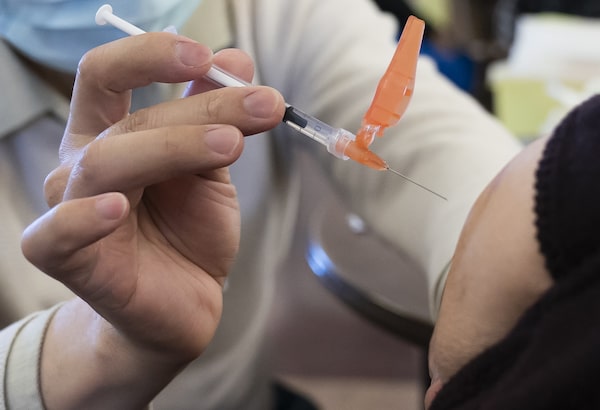
Ontario Health Minister Christine Elliott said National Advisory Committee on Immunization would be releasing new guidance on second booster shots in early April 2022.JONATHAN HAYWARD/The Canadian Press
Canada’s national immunization committee is expected to issue new recommendations in early April on who should get priority access to fourth doses as COVID-19 cases rise in many parts of Canada.
But a leading infectious-diseases physician says booster shots can only do so much to address the current surge and that policy makers need to reintroduce widespread testing, sick pay and other evidence-based measures to manage the situation over the long term.
“We do have some other tools we can use that do not involve lockdown that can contain this surge,” said Lisa Barrett, an infectious-diseases physician and researcher based at Dalhousie University in Halifax.
When will COVID-19 be endemic? The four factors that will shape the virus’s future
Although two – and especially three – doses of an mRNA COVID-19 vaccine are highly effective at preventing severe illness and death in many individuals infected with the Omicron variant, there are growing concerns that waning immunity could leave some higher-risk individuals more vulnerable.
The question of whether and when at-risk groups or wider pockets of the population should receive fourth doses has taken on greater urgency in recent weeks, as the highly transmissible BA.2 subvariant spreads throughout the country, due at least in part to relaxed health restrictions. Earlier this week, the U.S. Food and Drug Administration approved a second booster shot for all adults 50 and over.
Canada’s National Advisory Committee on Immunization has yet to give official guidance on fourth doses for most of the population. The committee did say in December that moderate- and high-risk immunocompromised individuals who need three initial doses of an mRNA vaccine to mount an immune response could get a fourth dose six months after their last shot.
NACI’s recommendations aren’t binding, but provinces often follow their lead when making vaccine policy decisions.
On Thursday, Ontario Health Minister Christine Elliott said NACI would be releasing new guidance on second booster shots this week. A spokesperson for the Public Health Agency of Canada said in an e-mail the recommendations would be released in early April.
Dr. Barrett said it makes sense to broaden access to fourth doses for people at the highest risk of severe outcomes due to COVID-19, such as immunocompromised individuals and seniors living in long-term care.
But there are other factors that have to be taken into consideration when thinking about making fourth doses more available to all, she said. For instance, it may make more sense to broaden access to additional boosters later this year, ahead of what many infectious-disease experts expect will be another wave, Dr. Barrett said.
Giving widespread access to fourth doses now beyond those groups at highest risk for serious outcomes could actually compromise the effectiveness of additional shots in the months to come, Dr. Barrett said.
“We may not be able to boost again in the fall as effectively,” she said.
Jurisdictions across Canada have relaxed or removed pandemic restrictions, including mask and vaccine mandates and capacity restrictions, in recent weeks, in an attempt to return to a level of prepandemic normalcy. But Dr. Barrett and many of her colleagues say these policies are flawed, as removing health restrictions and dismantling testing and other surveillance strategies makes it harder to respond to COVID-19 surges.
Instead, governments should increase testing and surveillance and think about other measures that can help prevent worst-case scenarios during COVID-19 surges, Dr. Barrett said.
“Being willfully dismissive of facts and lives is not okay,” she said.
Our Morning Update and Evening Update newsletters are written by Globe editors, giving you a concise summary of the day’s most important headlines. Sign up today.